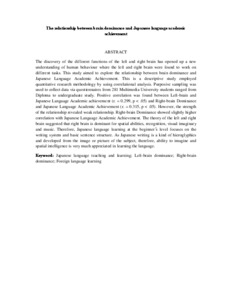Citation
Wei, Hui Suan and Sulaiman, Tajularipin and Baki, Roselan and Roslan, Samsilah
(2017)
The relationship between brain dominance and Japanese language academic achievement.
International Research Journal of Education and Sciences, 1 (spec.2).
pp. 48-51.
ISSN 2550-2158
Abstract
The discovery of the different functions of the left and right brain has opened up a new understanding of human behaviour where the left and right brain were found to work on different tasks. This study aimed to explore the relationship between brain dominance and Japanese Language Academic Achievement. This is a descriptive study employed quantitative research methodology by using correlational analysis. Purposive sampling was used to collect data via questionnaires from 281 Multimedia University students ranged from Diploma to undergraduate study. Positive correlation was found between Left-brain and Japanese Language Academic achievement (r. = 0.299, p < .05) and Right-brain Dominance and Japanese Language Academic Achievement (r. = 0.315, p < .05). However, the strength of the relationship revealed weak relationship. Right-brain Dominance showed slightly higher correlation with Japanese Language Academic Achievement. The theory of the left and right brain suggested that right brain is dominant for spatial abilities, recognition, visual imaginary and music. Therefore, Japanese language learning at the beginner’s level focuses on the writing system and basic sentence structure. As Japanese writing is a kind of hieroglyphics and developed from the image or picture of the subject, therefore, ability to imagine and spatial intelligence is very much appreciated in learning the language.
Download File
![[img]](http://psasir.upm.edu.my/59382/1.hassmallThumbnailVersion/The%20relationship%20between%20brain%20dominance%20and%20Japanese%20language%20academic%20achievement.pdf)  Preview |
|
Text (Abstract)
The relationship between brain dominance and Japanese language academic achievement.pdf
Download (49kB)
| Preview
|
|
Additional Metadata
Actions (login required)
 |
View Item |

